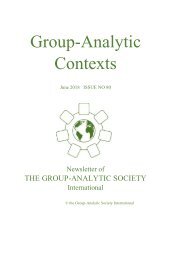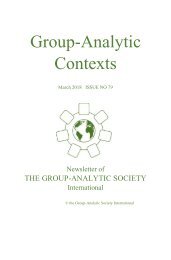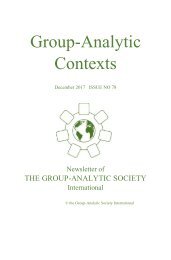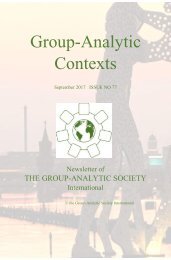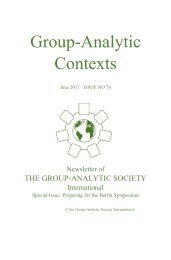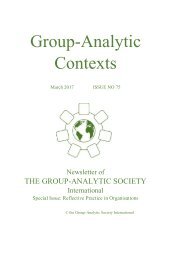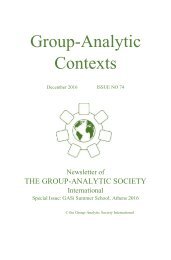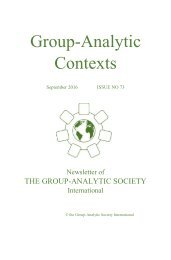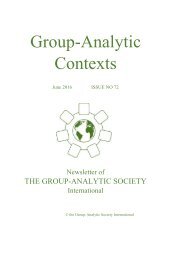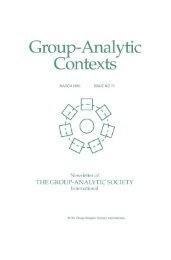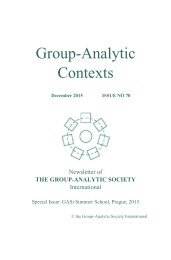Group-Analytic Contexts, Issue 81, September 2018
Newsletter of the Group Analytic Society International
Newsletter of the Group Analytic Society International
You also want an ePaper? Increase the reach of your titles
YUMPU automatically turns print PDFs into web optimized ePapers that Google loves.
60 <strong>Group</strong>-<strong>Analytic</strong> Society International - <strong>Contexts</strong><br />
to mention the questions which followed. In the psychiatric hospital,<br />
the questions had punctuated the dogmatism associated with current<br />
practices. The manager was uncertain what role she could return to<br />
with any confidence…. A murderer, provoked into violence by<br />
memories of abandonment, had been steadied by a current interaction<br />
provoking sadness and more hopeful memories – and altering how he<br />
was viewed in the group. Then the terrorist had been displaced as the<br />
location of evil by an unexpected impulse to protect - which the<br />
manager had apparently relinquished. For several group members,<br />
internal conflicts were no longer externalized, albeit in search of<br />
opponents to condemn or victims to protect. Uncertainty, particularly<br />
not knowing who the Visitors were, had kept everyone on edge.<br />
Nothing could be taken for granted. Roles, despite their professional<br />
trappings, had come to seem primarily ways of keeping people apart.<br />
Could something new really be created between people?<br />
What would happen if they all lived on the same street and<br />
continued to meet regularly? Would it be a bit like going to church –<br />
without the familiar rituals or the Supreme Being – unless they<br />
considered the Visitors in such a light? Would they develop rituals<br />
and lose their current uncertainties, or would anxieties just keep<br />
evolving into other anxieties? On a practical level, the warder couldn’t<br />
imagine the wealthier members of the group being willing to accept a<br />
similar standard of living to the poorer members – let alone the<br />
disruptions of living next to unpredictable and poorly socialized<br />
individuals. He could imagine the reaction if he suggested such a thing<br />
to his family. They would say he was bringing work home and that<br />
such things should be kept separate.<br />
How deep were the changes? There was hope and gratitude<br />
in Jason’s eyes. Nobody could think that hope – or gratitude –<br />
outweighed murder. Nobody said that aloud. The Visitors would<br />
expand the metaphor until society shared the weight.<br />
Chapter VI / IV<br />
Motivation<br />
‘I said, ‘Why not tell him that you know that when he steals he is not<br />
wanting the things that he steals but he is looking for something that<br />
he has a right to; that he is making a claim on his mother and father<br />
because he feels deprived of their love.’ I told her [the mother] to use<br />
a language which he [the son] could understand.’<br />
[From ‘The Anti-Social Tendency,’ 1956, D.W. Winnicott]



